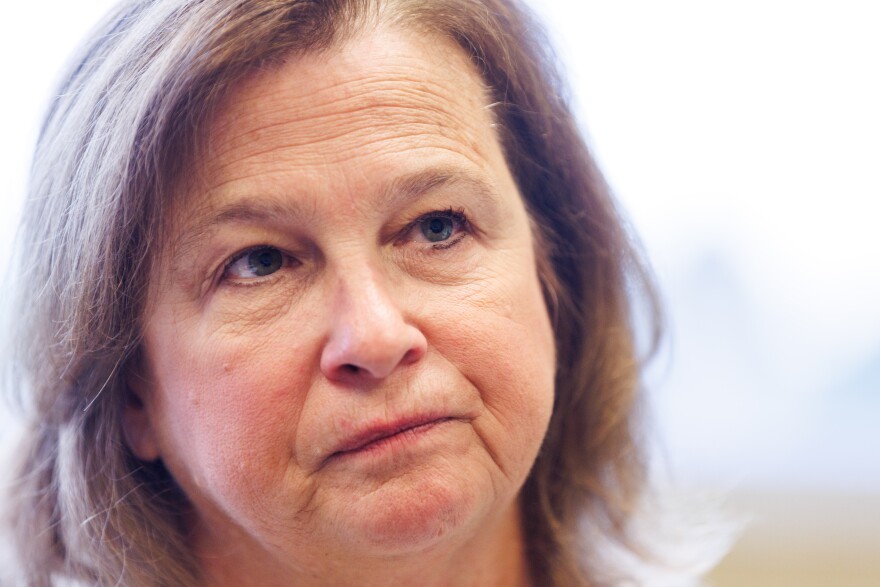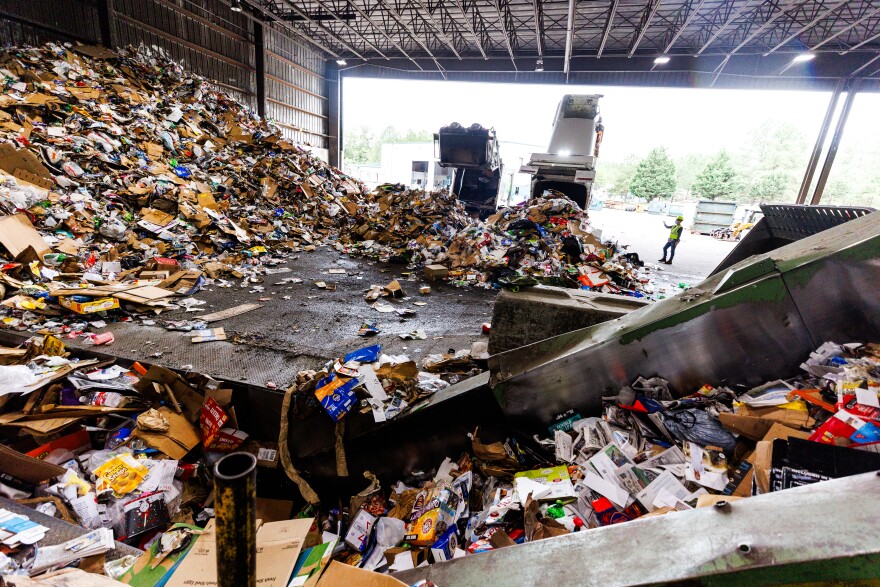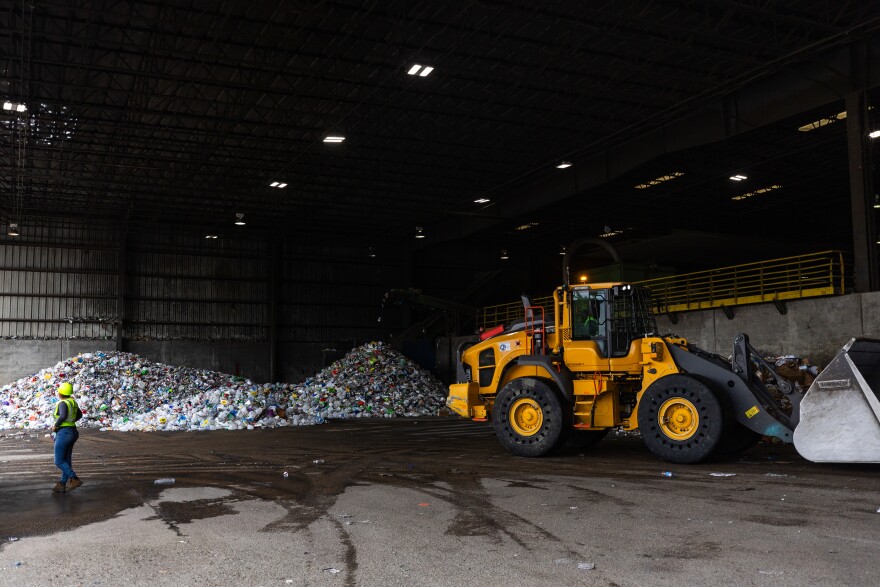Recent headlines have cast the global recycling system as broken.
That’s left many worried about what happens after they toss their delivery boxes, pickle jars and milk jugs in the recycling bin.
VPM News’ Curious Commonwealth previously investigated how much of Richmond-area residents' recycling is actually recycled. Since that piece was published, we’ve received more questions on the topic.
A lot of effort goes into keeping consumer messaging about recycling as simple as possible, said Kim Hynes, executive director of Central Virginia Waste Management Authority, an agency created in the late 1980s to help localities in Central Virginia plan for where their waste goes.
“The more convenient and easy that we can make it for residents to recycle, and giving them the tools and the information that they need, they’re more likely going to do it,” she said.

In Central Virginia, clean cardboard, paper, aluminum and steel cans, glass bottles and jars can all be tossed in the recycling bin. So can “most plastics that you find in your household,” Hynes said. “Water bottles, milk jugs, detergent bottles, shampoo bottles, things like that.”
What can’t be recycled? No styrofoam or plastic film. Grocery bags can be returned to stores that provide drop-off bins. They’re turned into more grocery bags or converted into plastic lumber for outdoor structures like fences and decks.
Virginia is home to Trex Company, Inc., one of the largest manufacturers of wood-alternative composite decking. According to the company, a 500-square-foot composite deck can contain up to 140,000 recycled bags.
But plastic recycling can get confusing. Hynes says she tries not to encourage consumers to focus too much on the numbers printed on the bottom of containers that tell manufacturers what type of plastic they’re made of. Although Nos. 1 and 2 are the most in-demand, the region's recycler has expanded to accept some others.
“This is important to remember, that recycling is a business in most places,” Hynes said. “And if there's not a market for these materials, the recycling isn't going to be there. ”
In 2023, up to 85% of materials brought into Central Virginia recycling centers were recycled, according to CVWMA. The remainder goes to the landfill because there’s not a profitable end market for those materials, they can’t be recycled or they’re contaminated.
But that 85% only includes the stuff that households send off to be recycled.
Another metric that’s tracked is the recycling rate, which measures the amount of materials recycled divided by the total waste a region generates. Areas in Virginia with larger populations are required by state law to maintain a 25% recycling rate. But not all localities have recycling programs, and not all recycling programs offer pickup.
Hynes told VPM News the 13 localities CVWMA serves — including Richmond and the surrounding counties — exceed that goal every year, recycling about 58% of their total waste.
“It's not just our programs that go into the recycling rate,” she said. “It's what everybody in the region is doing. So, commercial businesses, and other recycling processors that maybe don't have a contract with CVWMA.”
Virginia’s statewide recycling rate is a bit lower at 42.5%, based on 2023 data from the state’s Department of Environmental Quality. The highest it’s ever been is 46.1%, in 2018.

Another 2023 report by Ball Corporation, an aluminum packaging manufacturer, paints a grimmer picture — placing Virginia’s recycling rate for packaging and paper products at just 18%. (A spokesperson for Eunomia, the research firm that produced the Ball report, told VPM News that when considering all materials, the state’s recycling rate was approximately 36%, closer to DEQ’s figure.)
“When you hear 18%, you know there’s so much more potential,” said Elly Wilson, the director for Environment Virginia, a statewide environmental advocacy organization. “It puts us really in the middle of the country. I think we’re ranked about 25th in that report.”
Wilson encouraged consumers to keep recycling and minding guidelines as best they can.
“If you follow what your county or town says, it should then be recycled,” she said. “If you do it right.”
Shifting responsibility
But it’s not just consumers that can improve recycling rates.
“There’s an inherent disconnect between the people who make the products and the people who have to deal with it at the end of [its] life,” Wilson said.
One VPM News audience member asked, “Why are we responsible for taking care of the trash their product containers create?”
One proposed solution is Extended Producer Responsibility laws, which Wilson supports.
They differ slightly from state to state, but generally require companies to manage the recycling of their products and packaging after consumers are done with them. The laws also encourage creating more eco-friendly packaging. California, Colorado, Maine and Oregon have all adopted EPR policies, and Maryland passed one earlier this month.
“If we’re able to better bridge that gap, we’re actually going to be able to better recycle and have these really robust recycling systems where we don’t need as many virgin products anymore, because we’re not literally throwing value into our landfills every day,” Wilson said.
State lawmakers who’ve introduced EPR bills in Virginia have been met with pushback from manufacturers. Three such proposals were killed in 2022 by a Republican-led House subcommittee on agriculture concerned about the cost to consumers.
“American manufacturers, their worldview is around competitiveness,” said Brett Vassey, president and CEO of the Virginia Manufacturers Association. “Just about every product either has a domestic or a foreign competitor. So, everything they do every day is about improving their productivity and eliminating waste.”
He said EPR policies make companies less competitive.
“It just drives up the cost of those products,” Vassey says. “What we're proposing is a complete reimagination of this.”
Right now, he said, Virginia treats all solid waste like solid waste — not as a commodity.
“That's the wrong way to look at it. We want to look at all solid waste as a recoverable material or a fuel,” Vassey said.

Turning solid waste into fuel via “advanced” or “chemical” recycling has been criticized for its environmental impacts.
Vassey’s organization has proposed the state create a recycling infrastructure improvement fund — a competitive fund that local governments can apply for to address solid waste and recycling challenges. Vassey said they tend to be infrastructure-related, though the projects could be affected by uncertainty around global trade.
The infrastructure fund is modeled after the Water Quality Improvement Fund, which was used to clean up the Chesapeake Bay. Vassey called it the most successful public-private regulation in Virginia history.
Del. Rodney Willett (D–Henrico) introduced legislation during the 2024 General Assembly session to create the fund, but it failed to move forward.
One infrastructure problem, Vassey said, is that Virginia doesn’t have its own facility for processing and sorting glass for recycling.
“Right now in Virginia, we have two glass manufacturers,” Vassey said. “Most states don't have any. Both of those plants import their glass from New York and New Jersey. That's insanity. Because they can't get glass from Virginia.”
The closest processing facility is Sibelco, formerly Strategic Materials — in North Carolina.
CVWMA’s Kim Hynes recognizes the challenge this creates.
“Glass is heavy,” she said. “It costs more to transport it. So, when you’re transporting a load of glass from the recycling facility to the glass processor that’s 200 miles away, it kind of offsets the value that you might get from recycling glass.”
About 10% of glass food and beverage containers get recycled in Virginia, according to the Virginia Recycling Association, even though the material is infinitely recyclable. And VPM News reported last year that only about 8% of plastic bottles in the state are recycled.
That’s why some are advocating for a “bottle bill” to improve the recovery of glass and other materials — though a proposal in 2022 was rejected. Under that system, consumers would pay a deposit of a few cents per glass, plastic or aluminum container. Once the product has been used, the consumer can take the container to a redemption center to get their deposit back.
Ten states have “bottle bills,” and Environment Virginia’s Wilson is working to get support behind the proposal in Virginia.
“The status quo for a long time is just to rely on the goodwill of people wanting to be environmental stewards,” Wilson said. “We kind of need to move away from that and actually set up things that encourage recycling in a real way.”
This story was produced as part of the VPM News series Curious Commonwealth.












